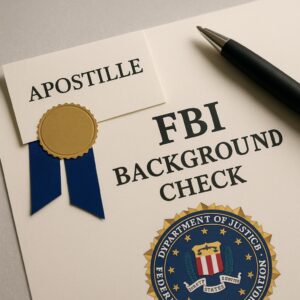
So, let’s say someone’s about to move to another country—maybe for school, work, or just starting a new chapter in life. One of the big things they might be asked for is a background check. In the U.S., that usually means getting an FBI background check, which is kind of like a report card for your criminal record. If there’s nothing on it, great! You’d think that’s all you need. But here’s the thing: having that report alone isn’t enough.
That piece of paper might work fine inside the U.S., but most countries don’t just accept it as-is. They need proof that it’s real. Not because they don’t trust the FBI, but because every country has different rules when it comes to official documents. And that’s where something called an “apostille” comes in.
What Even Is an Apostille?
An apostille is a special certificate that gets attached to official documents to make them legal in other countries. It’s not something that changes the information on the paper. It just proves that the document is legit and came from the proper U.S. agency.
Think of it like this: the FBI background check is the document, and the apostille is the international stamp that says, “Yep, this is the real deal.” Without it, other countries might reject the paper, even if everything on it is true.
This can be a huge problem if someone’s already traveled or sent their papers ahead. Imagine getting to immigration or a job interview overseas and finding out the paperwork isn’t valid. That delay could mess up visas, job offers, or school admissions.
To make sure this doesn’t happen, it’s smart to go through a trusted source that can help get the document legalized properly. For example, if you ever need help getting an Apostille for FBI background check, there are services that make the process easier and faster—so you don’t have to figure it all out on your own.
Why Other Countries Need It
So, why does another country care whether an FBI report has this extra stamp or not? It comes down to trust and verification. Every country has its own way of doing things. In the U.S., people trust the FBI to issue accurate reports. But a government in, say, Spain or South Korea, has no way of knowing if that paper someone handed over really came from the FBI or if it’s just a really good fake.
The apostille solves that problem. It’s part of an agreement called the Hague Apostille Convention, which includes over 100 countries. All these countries agreed to use this system to verify documents from each other. So when an American document has that apostille attached, other countries know it’s been checked and approved.
If someone is moving to a country that’s not part of the Hague Convention, the process might be even more complicated. It might involve a longer chain of authentication, including the U.S. Department of State and even the foreign country’s embassy. But for most places, the apostille is enough.
Getting an FBI Check Isn’t the End of the Process
Here’s where a lot of people get stuck. They request their background check from the FBI and think they’re done. But once the report comes in, it still needs to be sent to the right office to get the apostille attached. That’s not something the FBI does automatically. It’s a whole extra step.
And it’s not just about mailing it somewhere. The process needs to be done correctly—making sure the document is the right format, sending it to the right agency, and waiting for it to be processed. This can take time, which is why people who are in a rush to get a visa or start a job might run into delays if they don’t plan ahead.
What Happens If You Skip It?
Skipping the apostille can lead to a lot of headaches. For example:
- A work visa might be denied because the background check doesn’t meet local rules.
- A university could hold up enrollment because documents weren’t certified properly.
- A person trying to get married overseas might be blocked from registering with local officials.
Basically, the apostille is often a required step, even if it’s not always explained clearly upfront. Without it, the FBI background check might be treated as invalid or just ignored completely.
How Long Does It Take?
The time it takes to get an apostille depends on how and where the process starts. Some people try to do it all on their own, which can take weeks or even longer, especially if they’re not sure where to send the documents.
Others choose to work with services that handle everything for them. Those services can often get things done much faster because they know the system and can avoid the usual mistakes. It’s still a waiting game, but the process is way less stressful.
Who Needs This the Most?
The people who usually need apostilled FBI checks are anyone planning to:
- Work abroad
- Study in a foreign country
- Adopt a child internationally
- Get married overseas
- Apply for long-term residency or dual citizenship
In some cases, even volunteer programs or language schools ask for them. So it’s not just for big jobs or permanent moves—it can come up in all kinds of situations.
It’s Not Just About Criminal Records
Even if someone has a clean record, they still need to go through this process. The apostille doesn’t change anything on the report. It just makes sure that the report itself is accepted and trusted in other places.
Some people think, “Well, I don’t have anything to hide, so why would they reject my paper?” But the issue isn’t what’s on the report—it’s whether the report meets that country’s legal standards. Without the apostille, it usually doesn’t.
Wrapping It Up
Getting an FBI background check is only part of the job when planning a move or trip that involves legal documents. Most people are surprised to learn they need more than just the paper with their name and record. But skipping the apostille can mess up a lot of plans.
The best move is to figure out early on whether a destination country is part of the Hague Convention and whether it needs documents to be apostilled. Getting that handled before anything else saves time and stress later.
Moving abroad can be exciting, but it also comes with a lot of paperwork. Doing it right from the start makes everything smoother. Don’t forget the apostille. It might be just a stamp, but it can make a huge difference in how far that FBI background check actually takes you.







